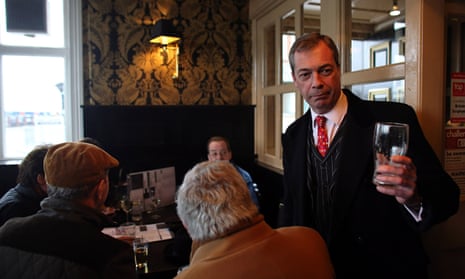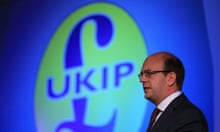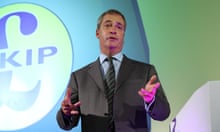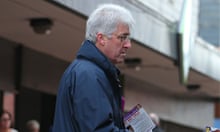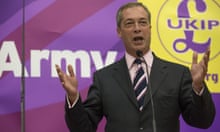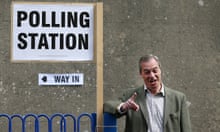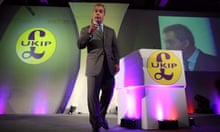The destiny of political insurgencies is often shaped by specific events. While challenges to mainstream authority might be a long-time coming, anchored in groups of citizens who have long felt ignored or poorly treated, their eruption into political life is often fuelled by a chain of events. In the 14th century, strongly held grievances among rural workers laid the foundation for the Peasants’ Revolt. But it was the arrival of tax collectors in south-east England that proved the final straw, turning a protest into a wider insurgency across much of Essex, Kent, Norfolk and Suffolk.
Fast forward more than 600 years and it is perhaps no coincidence that the same areas of England are emerging as the heartland of a new insurgency against London elites. Much like the Peasants’ Revolt, Ukip is anchored in older grievances among working class Britons who feel left behind economically, are angry about the political elites in London, and profoundly anxious over the pace of social change. And like those workers in the 14th century who flocked around the apparently charismatic Wat Tyler, over the coming weeks Nigel Farage will lead his followers through a chain of events that will determine the destiny of his modern revolt against Westminster.
The first of these events is on Thursday, when 2,000 Ukippers will descend on the Labour-held town of Doncaster for its annual conference. This will be Ukip’s last major gathering before the 2015 campaign, which will be Farage’s first general election as leader. The location is symbolic. Farage could have assembled his army of the left-behind in one of his east coast strongholds, but these days he is more ambitious. Ukip branches in Yorkshire are growing quickly and, in the aftermath of child sexual exploitation cases, a perfect storm is gathering in nearby Labour-held seats such as Rotherham. Doncaster is very much about sending a message, but it will also shape the message of this revolt itself.
Ukip is no longer a single-issue party. Since 2010, the party has successfully merged Europe and immigration in the minds of its voters. But its insurgency still faces a major hurdle that is reflected in recent polling by Ipsos Mori. Whereas Ukip has become the preferred party among all voters on the two issues of Europe and immigration, it is not even on the radar when it comes to subjects such as the economy, health and education. So long as immigration remains a top issue – it is currently number one – this narrow appeal does not matter. But this will not always be the case.
This is what led Farage to initiate a review of policy over the summer. Doncaster will be used to set out this broader pitch to struggling voters who, arguably, Labour should be winning over: no tax on the minimum wage; opposition to the bedroom tax; cuts to overseas aid; direct democracy; grammar schools; and a rebuttal to Labour’s claims that Ukip would privatise the NHS and charge voters to see their local GP. Ukip and Farage have walked into the casino of British politics, and by modifying their message they are about to double down on the left-behind.
The second event arrives two weeks later, on 9 October, in the southern coastal seat of Clacton where a parliamentary byelection will see Ukip almost certainly secure its first elected MP. But the significance of Clacton is not just about the seat. This local battle offers an intriguing look into the political geography behind Ukip’s revolt. On the ground, the party has been targeting two groups of voters: struggling workers in disadvantaged Labour-leaning areas such as Jaywick, and disgruntled Tories in more secure areas such as Frinton. Farage has been sent into working class pubs; Douglas Carswell to knock up angry Tories.
Clacton is a microcosm of what Ukip is trying to achieve nationally: a coalition of left-behind Britons who once voted Labour, and social conservatives who dislike Brussels and loathe Cameronism even more. Whether Ukip can anchor its insurgency in this more diverse, and hence sustainable, electorate remains to be seen. But what is clear is that its lieutenants are learning; all of those who will be running Ukip campaigns along the east coast are helping Carswell in Clacton.
The final event arrives on the same day, but in the northern Labour-held seat of Heywood and Middleton. Ukip is unlikely to win this Labour-friendly seat, but the battle will shape its revolt in another way. Farage is no Pierre Poujade – the populist who led a flash protest against the French establishment in the 1950s. He has a clear strategy for building a longer insurgency, a core plank of which is to establish Ukip as Labour’s main opposition in the north. Nor is this political fantasy: at the European elections in May, across 51 authorities in the north-west and north-east, Ukip finished ahead of Labour in 18 and as its main rival in 30. A strong second-place finish in Heywood and Middleton will underscore the strategy.
If Ukip can win the popular vote across a swath of Labour territory when Ed Miliband and Labour are the official opposition, then what will happen at the 2016 local elections and thereafter, when Labour is the unpopular incumbent?
